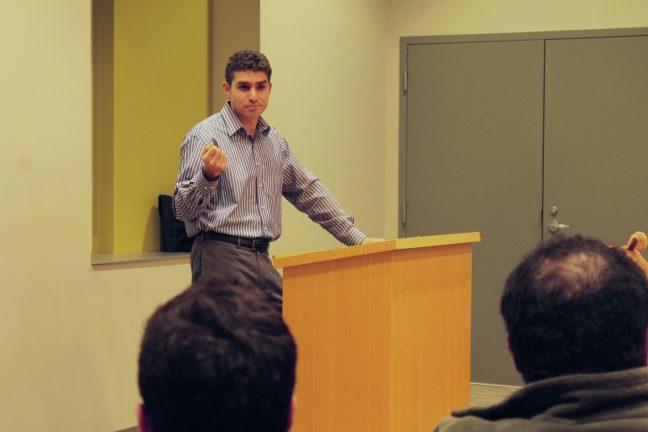Less than a week of Trump’s new administration has already brought changes domestically, and a group of students gathered Wednesday to learn about what it might mean abroad — particularly in terms of U.S.-Israeli relations.
In an event hosted by Badgers for Israel at UW Hillel, Nadav Shelef — a political science professor and expert on Israeli politics — discussed the possible changes to Israeli foreign policy during the Trump administration.

At the moment, Shelef said he doesn’t believe Trump even knows what is to come in terms of the country’s relationship with Israel.
But in Israel, the picture is much different, Shelef said.
In the past, the United States took the stance of condemning Israeli settlements in the West Bank, which are forbidden under international law according to the 1967 United Nations Security Council Resolution 242.
As a new president takes over, a lot of excitement has sprouted on the right-wing Israeli political spectrum as they believe they now may have an administration sympathetic of their desire to annex the West Bank, Shelef said.
Most of the excitement from right-wing Israelis stemmed from the appointment of David Friedman as the next U.S. ambassador to Israel. Friedman has adamantly rejected the possibility of a two-state solution in the past, and has even called for a probe for anti-Israel activities and movements on college campuses.
“There have been increasing calls by politicians and leading thinkers on the Israeli right that they should use this moment and seize the opportunity,” Shelef said.
While he would be surprised if Israel has “as free a hand” as their right-wing believes it has, he said there are a few reasons to think why American pressure may reduced or the “volume may be lowered.”
First and foremost, we don’t know Trump’s order of priorities, he said.
And while the next U.S. ambassador to Israel rejects a two-state solution, other members of his cabinet — mainly Secretary of State Rex Tillerson, U.S. Ambassador to the UN Nikki Haley and Secretary of Defense James Mattis — are advocates for the proposal, Shelef said.
“Who will come out, we don’t know,” Shelef said.
With regards to his broader priorities, Trump appears to be an isolationist and is committed to fighting radical Islamic terror, Shelef said.
But in terms of protecting the best interests, Shelef questioned what Trump will put first: America or maintaining a good relationship with oil-producing countries.
“The question is will the U.S. take an active interest with what goes on in the Middle East, as American interest has waxed and waned over time [in that region],” Shelef said.
As the fight against Islamic terrorism will require a concentration on ISIS in context of the conflict in Syria, Shelef also questioned whether American action against ISIS this year would benefit Israel in the long run.
Tale of two lectures: Jewish and Palestinian student groups passively conflict over guest speakers
By removing ISIS from that region in Syria, Bashar al-Assad — whose presidency sparked the civil war — will stay in power, Shelef said.
If Assad remains in power, Iran will also stay in the area, which means Hezbollah — an Islamic militant group in Lebanon — will maintain access to arms, he said.
“It’s not clear if this would be a good thing from Israeli perspective,” Shelef said.
If America’s ally in the fight against ISIS is Iran, it is also not clear how the U.S. is expected to ally with Iran and simultaneously exert pressure on them to not pursue their missile program, Shelef said.
While some policies may remain unknown in coming years, one thing is for certain: the U.S will continue providing financial aid to Israel. Over the next 10 years, Israel will receive $38 billion in military aid.
“I suspect Trump believes he means what he says when he says it,” Shelef said. “But we don’t know what the order of his priorities are in this administration.”


